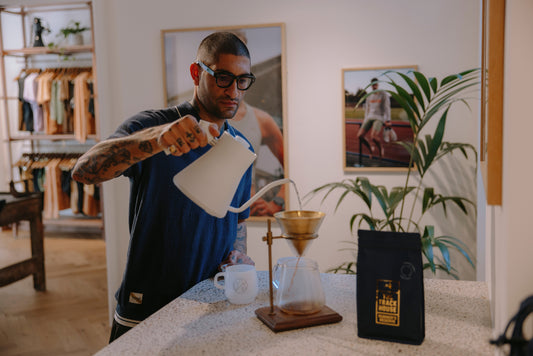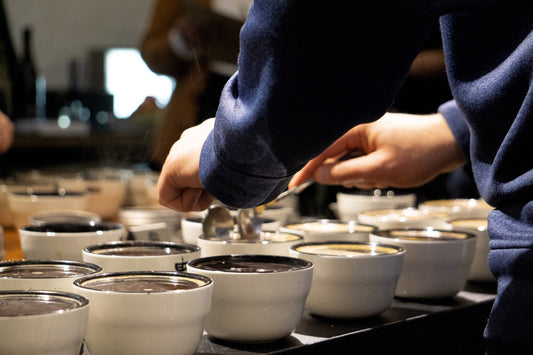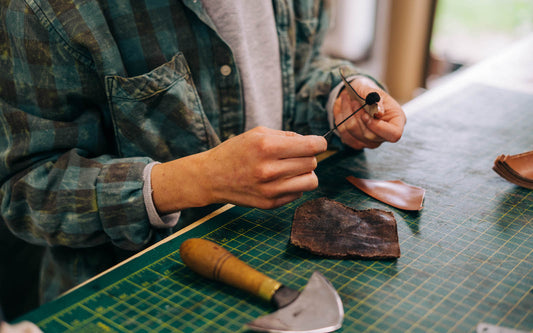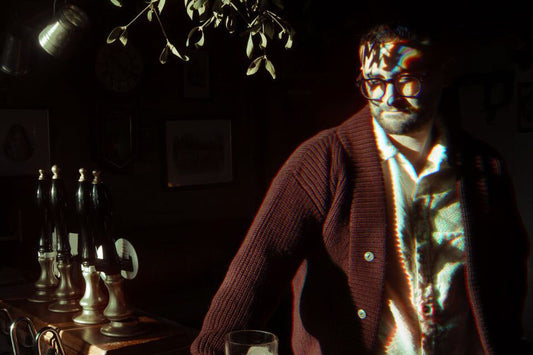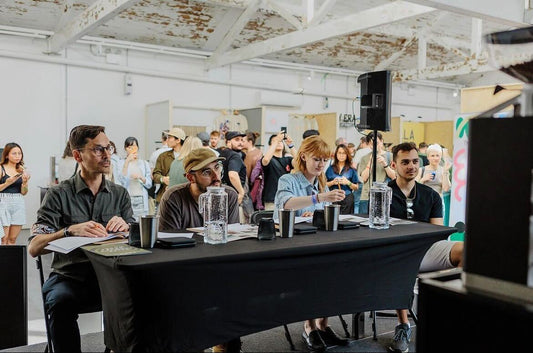The second in a three-part series of guests posts from James and Tom (AKA The Tempest Two), the two head out into the abyss.
The enormity of their endeavour becomes apparent, the dangers they face become all to real and their Aeropress brewing technique is somewhat compromised.
-- Richard
As the sun-dropped on Day 1, the enormity of what lay ahead finally dawned on us.
The departure was a surreal experience, no fireworks, start-guns or theatrics. Just the two of us, in a rowing boat, quietly rowing into the distance. The feeling is one that will stay with us forever, and an emotion we now crave since being back on land. As the sun finally disappeared, the first night-shifts began, which meant rowing alone on deck – in the dark – for the first time.
For the first couple of weeks, the night time represented a real fear; an innate dread of the unknown. Children are scared of the dark because of monsters under their bed. What we feared was more real.
It’s worth mentioning at this point, that, for the vast majority of our crossing, the moon was not present. The nights were therefore filled with an impenetrable darkness. Lights were useless and would only hinder our night-vision, so we were surrounded by black, praying that the breaking waves wouldn’t find us as we resorted to guessing our boats position on the wave, often resulting in the loud crack of the oars against our shins – waking both of us up.
On the 12th day, at 5:13AM, a breaker found its mark and turned our humble boat (Roberta) upside down. James was thrown from the seat and into the icy water. Under water, headphones still playing music into his ears (Rihanna if you are curious), the seconds seemed like hours as James tried to break the surface. Just managing to grasp the edge of the boat, which by this point had righted itself, he thanked his lucky stars.
Many who have not spent time at sea would envisage simply swimming back towards the boat and climbing aboard. Sadly, the process isn’t this simple. If you become separated from your boat, and have no life-line attaching you to safety, the odds are heavily stacked against you. Within seconds, you can be swept away by currents even an Olympic swimmer couldn’t overcome.
Aside from the obvious shock of the event, what amazed us about the capsize was the way an innate instinct of survival kicked in almost instantly. There was no panic or distress, instead approaching the situation methodically and calmly. When the shit hit the fan, auto-pilot took over and we dealt with it.
Every day that passed, we gained knowledge of the sea, adapting to our surroundings so that, within a couple of weeks, we had become accustomed to the sleep patterns and the physical demands of the gruelling 2 hours on, 2 hours off routine. It is truly incredible how the body and mind can evolve to cope with new challenges and environments. We became fitter, stronger and more savvy as every day passed. We learnt to read the sea and understand its warning signs, even beginning to predict when the waves would pick up depending on the positioning of the sun and moon, and at what times our bodies would crash if we didn’t eat enough.
Routine at sea played a huge part of our daily success, both mentally and physically. We cooked our freeze dried meals every 6 hours.
9am. 3pm. 9pm. 3am.
These were supplemented by our daily snack packs, which included Pip and Nut, Coconut Oil, a variety of chocolate, Bounce balls and – as often as the temperamental ocean would allow – Workshop Coffee.
Every other day (weather depending), we would boil an extra 600ml of water in the JetBoil during our 3pm feed and begin to prep the Aeropress. Although it seemed like a stretch, and after a relentless session of rowing, even a hassle, the coffee provided a real lift in both the process and the finished result.
As the water was boiling, James would pull the coffee, Porlex hand grinder, brewer and filter papers out of the dry bag and measure out the coffee before grinding and beginning to brew using the freshly JetBoiled water. Placing the plunger on its top, he’d begin his less-than-scientific mental timer (usually half a song on the iPod) before plunging straight into an enamel mug or into the Thermos for later.
The entire process was made all the more interesting by the pitching and tossing of our boat, Roberta, in the seas. Over the entirety of the trip, we only fumbled and subsequently lost two coffees. At the time, it was devastating, but in retrospect, we’ll take those odds.
Before leaving land, we split our trip into three zones. Zones One and Three were both 900 miles, whilst the middle section – Zone Two – was 1,200. Zone One was used to settle in, get comfortable and learn as much as we could. Zone Two was about establishing a steady and consistent pace, staying safe and being cautious, Zone Three was when we’d put the boosters on and the intention from there on in would be to up our speed and intensity as we approached the finish line.
Providing manageable targets, this removed the risk of us trying to tackle the enormous challenge in one go, allowing us to tick smaller progress points off as we went. One bad habit we failed to avoid picking up was constantly analyzing our average pace, distance travelled and the weather. We were constantly looking at these variables to try and predict when we’d arrive at the finish. With so much thinking time on the oars, it was almost impossible to stop yourself doing the maths. Over-analysis builds false hope and is a recipe for disaster, as fast-changing weather and storms soon crush optimism and ultimately your goals.
Our days at sea became a blur, and time became obsolete. Our digital watches simply remained on UK time, as the only reference we needed was when to call home. In our world we worked only in 2 hour blocks and by the sun and the moon. As we approached Zone Three, we were told that we had a weather window that would guide us into Barbados.
Strong following winds, nice steady swells; everything was looking good for a fast finish…
Share:




